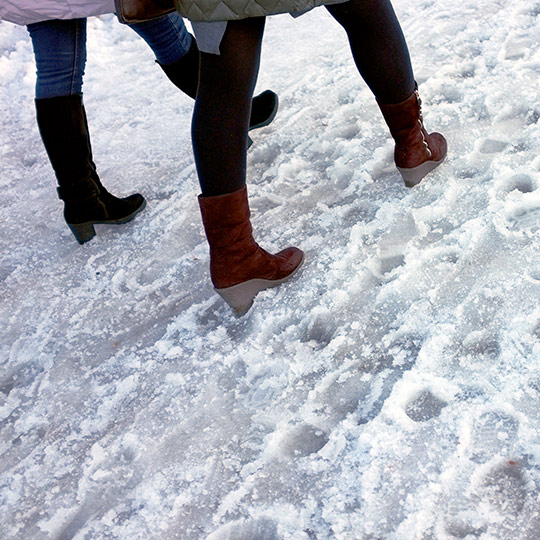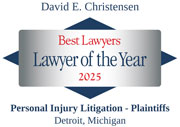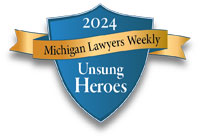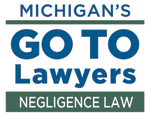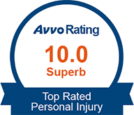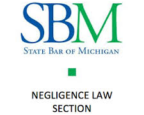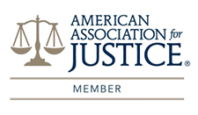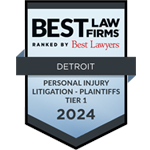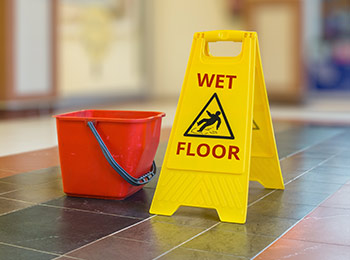
When you visit a store, restaurant, park, or other public place in Michigan, you have a reasonable expectation that walkways, staircases, and other surfaces are safe to set foot on. You never think you will end up with life-altering injuries, but these accidents send 8 million people in the United States to emergency rooms each year.
If you or a loved one have been injured in a slip and fall accident in Michigan, contact the Michigan slip and fall lawyers at Christensen Law today to start pursuing compensation for your injuries and damages. Schedule a free initial case review to talk with one of our skilled slip and fall lawyers in Michigan about your rights.
You didn’t cause your accident, so you shouldn’t be left covering the bills. Our firm can help you pursue the maximum financial recovery possible for your case. There is no fee unless we win for you. Call us or use our online contact form to learn how we can help you seek justice.
Can You Sue for Slip and Fall in Michigan?
Because no one expects to be injured when they are legally allowed on the premises, Michigan state law imposes a duty on property owners and managers to take reasonable steps to protect visitors from harm. When they fail in this duty and it results in injuries in a slip and fall accident, property owners and operators can be sued.
By contacting a Michigan personal injury lawyer to pursue a slip and fall claim, you can demand that the at-fault party pays for your treatment, lost wages, pain and suffering, and other losses. However, many property and business owners dispute that they caused the injuries and damages you’ve suffered.
Your compensation after a slip and fall accident may depend on having knowledgeable, skilled legal representation on your side. David Christensen is prepared to fight for the settlement you deserve. You can sue if you were injured in a slip and fall in Michigan, but filing a claim is just the beginning when it comes to seeking justice. Your Michigan premises liability attorneys will fight for you from start to finish.
How Can a Michigan Slip and Fall Lawyer Help You with Your Premises Liability Case?
If you have a slip and fall claim in Michigan, you may be wondering whether you need a slip and fall lawyer. A Michigan slip and fall attorney can help you maximize the recovery in your slip and fall claim by:
- Investigating your accident, including filing requests to preserve important evidence like accident or incident reports or surveillance video of your fall
- Identifying at-fault parties and possible sources of compensation, such as insurance policies, since many businesses have layered liability coverage
- Working with engineering, medical, or financial experts to build a strong legal argument that shows how your fall occurred, how the property or business owner or another party was at fault, and what damages you have incurred as a result
- Advising you about your rights and options for pursuing your claim, keeping you updated on the development of your case, and proposing the best path forward at each stage
- Aggressively negotiating on your behalf with the insurance company and defense attorneys to seek full, fair compensation in a settlement
- Preparing to take your case to trial if a settlement cannot be reached, and persuasively and vigorously advocating on your behalf to the judge and jury for a judgment in your favor
Having an experienced Michigan slip and fall lawyer representing you can take the pressure off of you while you focus on your recovery. You will be able to rest easy knowing that your claim is in the hands of Michigan slip and fall lawyers who are ready to fight for you.
Common Causes of Accidents that Lead to Slip and Fall Claims in Michigan and the Injuries Our Premises Liability Lawyers Can Seek Damages For
A slip and fall accident can be caused by any hazard on the ground that causes a person to slip or trip and lose their balance. Some of the most common causes of slip and fall accidents that lead to Michigan slip and fall claims include:
- Snow and ice
- Standing water
- Oil or other slick or slippery substances
- Mud, dirt, or gravel tracked in from outside
- Recently mopped or waxed floors
- Broken or loose tiling or hardwood flooring
- Torn or loose carpeting or rugs
- Broken steps
- Uneven stairs
- Abrupt transitions between flooring heights
- Abrupt transitions between flooring surfaces
- Broken or missing handrails
- Broken or uneven pavement or potholes
- Debris or trash on the ground
- Loose wires stretched across walkways
Any of these situations could lead to life-changing injuries, leaving the injured party in a position where you need to file a claim to recover your damages.
Our Michigan slip and fall lawyers will file a claim for a wide range of injuries that commonly result from these types of accidents. These may include broken bones, sprains, and strains; traumatic brain injuries from hitting the head during a fall; spinal cord injuries; severe bruising and lacerations; and long-term conditions such as chronic pain or mobility issues.
Your Michigan premises liability attorney will also pursue damages for emotional and mental health complications, lost wages, and any diminished earning capacity due to lasting impairments. Our goal is to ensure that you are fully compensated for both the physical and financial impact of your injuries.
What Compensation Can Our Michigan Premises Liability Lawyers Pursue in Your Slip and Fall Case
If you’ve been injured in a slip and fall accident in Michigan, you may be entitled to compensation for the injuries and damages you’ve suffered as a result of the accident. The compensation you could receive includes both economic and non-economic damages. Let’s take a look at what our premises injury lawyers in Michigan can get for you:
Economic Damages
In a Michigan slip and fall claim, your economic damages will be the accident-related costs that have specific dollar amounts attached to them. In other words, costs you have itemized bills for. These could include:
- Cost of past and future medical treatment, including for hospital stays, doctor’s office visits, surgeries, other medical procedures, prescription medication, or physical and occupational therapy
- Cost of long-term care, including mobility or other medical equipment, home alterations to accommodate injuries or disabilities, or personal care
- Lost wages or income during the time that you miss from work while recovering from your slip and fall injuries
- Lost earning capacity, if your slip and fall accident disables you from earning the level of income you did pre-accident
Christensen Law will work with you to calculate the full cost of your injuries and work to recover a settlement that compensates you fairly for your economic damages. Your Michigan premises liability lawyers will also make sure you are fairly compensated for your non-economic damages.
Non-Economic Damages
The suffering victims of slip and fall accidents endure goes beyond bills and invoices, as the injuries you sustain could change the course of your future. If you were injured, you also deserve compensation for losses that aren’t as easy to quantify. These can include:
- Pain and suffering, or the physical and emotional anguish brought about by your injuries
- Loss of enjoyment or quality of life, caused by embarrassment over your injuries or the inability to participate in activities or perform tasks of daily living
- Loss of consortium, which compensates your spouse for the loss of your companionship
These accidents can cause significant physical pain, ranging from minor bruises to severe injuries like broken bones or head trauma. The accident and recovery process also often lead to anxiety, depression, or fear of future falls. The injuries may limit the victim’s ability to enjoy daily activities or hobbies or even result in chronic pain or permanent disability.
Non-economic damages acknowledges the impact of the accident on the victim’s life, and this compensation aims to provide some measure of justice and support for the often invisible, but very real, impacts of slip and fall accidents on a person’s overall well-being. Let our Michigan premises liability attorneys fight for your rights and get you the money you deserve!
Be Sure Our Michigan Premises Liability Lawyers Will File Your Claim on Time to Obtain Maximum Compensation
After you’ve suffered a slip and fall accident on someone else’s property, you have a limited time in which to file a lawsuit to seek compensation for your injuries and damages. This is known as the statute of limitations.
In Michigan, the statute of limitations on slip and fall lawsuits is three years from the date of the accident. The statute of limitations may be extended, or “tolled,” in very rare circumstances. If you fail to file your lawsuit before the expiration of the limitations period in your case, you may lose the right to seek compensation in court.
If your slip and fall accident took place on government or public property and you wish to file a slip and fall claim, you are required to give the government notice of your claim. The notice period depends on which government entity you are filing your claim with. They can range from 120 days from the date of the accident for claims against the state government to as short as 45 days for claims against certain municipalities in Michigan.
Our experienced Michigan premises liability attorneys will file your claim or lawsuit within the appropriate time limits to protect your rights and maximize your potential compensation. No matter who is responsible for your slip and fall injuries—whether it’s a private property owner, business, or government entity—we will thoroughly investigate the circumstances, identify the liable parties, and pursue every avenue for recovery. Our goal is to ensure that you receive the full and fair damages you deserve for the short and long-term impact of the accident on your quality of life.



